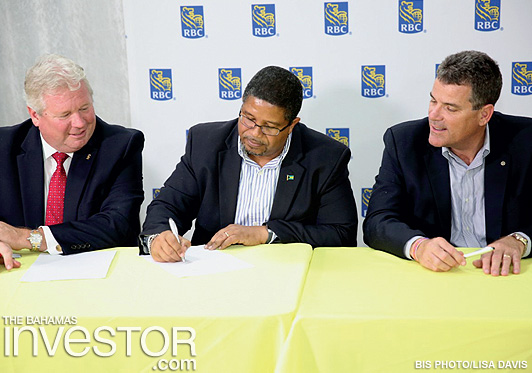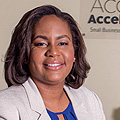| Published: Date: Updated: Author: |
The Bahamas Investor Magazine September 1, 2019 September 1, 2019 Steve Cotterill |
The Small Business Development Centre (SBDC) is part of an initiative by the government of The Bahamas to cultivate the nation’s entrepreneurs and business talent to help grow the economy and build for a sustainable future.
The SBDC is the result of a tripartite arrangement between the Ministry of Finance, the University of The Bahamas and The Bahamas Chamber of Commerce and Employers’ Confederation.
The centre works to guide the development and funding of small and medium-sized enterprises (SMEs) throughout the country and help prospective entrepreneurs realize their dreams of business ownership, as well as aiding existing businesses to remain competitive in a complex, ever-changing national, regional and global marketplace.
Davinia Blair, who was appointed executive director of the SBDC in June last year, offers some insight into the aims of the initiative and the government’s vision for the future of Bahamian businesses.
Q:What was the thinking behind the creation of the SBDC?
A:The government has been charged with stimulating the economy through creating employment, among other things. Traditionally, foreign direct investment (FDI) has been the main conduit to achieve this, rather than through domestic investment.
However, in regards to sustainable investment, the government looked at new models to encourage local people to create their own businesses so that Bahamians can invest more readily in their own economy, contributing through employment, local commerce and business-to-business activities.
Expanding and encouraging small businesses is an easy method to create sustainable growth and one that has been used around the world, in many cases accounting for the lion’s share of employment. Even before our current efforts, registered small businesses in The Bahamas employed just under 50 per cent of the workforce and generated 20 per cent of the country’s overall revenue, supporting a significant percentage of the population.
If the centre, as envisioned by the government, is able to strengthen existing businesses and expand the number of small enterprises creating employment for Bahamians, then I think we have an economy that can survive international shocks much more successfully than the FDI model.
Q:What resources are available for the programme and how is it funded?
A:The government has provided $1 million for operational expenses and $4.5 million in additional finance to directly benefit entrepreneurs. There is also a commitment from the Bahamas Entrepreneurial Investment Fund, which is a government equity fund, to make available $750,000. Of the $4.5 million, $50,000 will be distributed in grants and the rest will be used as leverage for a loan programme with the banks. Through our relationship with local banks we will be able to yield $9 million in loans.
Q:When the centre opened in September last year, what were the initial challenges?
A:We launched the centre on September 20 and by September 24 we had our first client registered. The main challenge in setting up operations was that there were a lot more people interested in the programme than we had originally planned for. As a consequence, we had to increase our staff complement quite quickly to manage the demand. Even now we have a significant waiting list. At present we have around 3,500 registered clients, about 14 advisors and seven or eight full-time staff.
The second major and ongoing challenge is that we are still in the process of cultivating the entrepreneurial ecosystem in The Bahamas. Ecosystems everywhere are always evolving, but in The Bahamas we are at the point where we need a clear strategy to bring us up to speed.
Another challenge is that we have entrepreneurs coming into the centre looking at creating a brand new start-up and the whole idea of the “minimal viable product” is something alien to
them. They have a lot of great, big picture ideas, but little concept of how to achieve them. We have to manage those expectations. We are having to do a lot of training around setting up the initial portion of the business so that they can prove themselves as entrepreneurs, and trial their systems, operations and financial management. Then we can help them grow over time to achieve the major vision they have for the business. That has been a bit of an uphill struggle, but our clients are learning.
Q:In what areas of business are you seeing the most interest?
A: We are definitely seeing a concentration of start-ups in the service industry and generally they have some connection to tourism. After tourism, the food and beverage industry and the creative arts; it is very diverse. We are seeing all sorts of ideas in all sorts of industries, which is great because it means that our entrepreneurs aren’t taking a narrow-minded view about how they want their business to contribute to the economy. We are seeing new technologies, manufacturing, alternative energy projects and any number of innovative projects. Even within the major industries we are seeing a lot of innovation and interconnectivity with other sectors.
Q:What is your role in the initiative?
A: My role is really to take a bird’s eye view. I don’t directly manage the
advisors but I am responsible for their output so I have to inspire them, equip them and monitor their accountability.
Then we have an operations team that I am responsible for and which I help to direct in terms of new strategy, processes and policies to overcome any challenges and maximize opportunities. Then there is also the funding and governance side, so we have to make sure we are fulfilling our board and government commitments.
On top of this there is the public-facing element. There is a level of accountability and people in general want to know how things are going.
The Bahamas is made up of many islands spread over a large area and we have to deliver the programme with the same efficacy across all the islands. It is quite difficult to keep everyone, everywhere happy. It requires a lot of skill building and you have to attract and retain the right talent.
Q:What has been the take-up of your services in the Family Islands?
A: It is almost 50-50 between New Providence and the Family Islands. Nassau accounts form around 50 per cent of our clients; Grand Bahama around 25 per cent; and the rest are spread across the major islands. Abaco is the next largest, then Andros, Eleuthera and Exuma. It is very much a programme for the whole of The Bahamas, not just for New Providence.
Q:What are your clients looking for and what are your core services?
A: The first question entrepreneurs usually ask is how soon can I get the money? After that we get into the real matter of building the business plan and outlining their vision. We have to start with the language of business, so that we understand what we are talking about when looking at the core concept of the business. So far, the major deliverable has been around teaching those basics of business. We have trained nearly 500 people through our two-week programme of classes and a further 200 or 300 are doing substantial hours with our one-to-one business advisory services.
However, we can’t just focus on the clients we have now. We have to think about the future generations of entrepreneurs. So we have put considerable efforts into building awareness about business, concepts at the primary and high school levels so that by the time these individuals are ready to start their own businesses, certain concepts are not foreign to them.
Q:How do you see the initiative developing?
A: In two or three years time we will have passed several major milestones. We will have successfully pursued the introduction of legislation for sustainable SME development support and policies that help to bolster such development. We will be working on that over the next 18 months.
We will also be looking to adapt the funding model. For start-ups, we really need to develop more of an equity model than the debt model that we currently have. We are looking to attract
equity funds for our clients and promote crowdfunding. We want to be able to share the benefits and the risks involved with start-ups.
At the moment we have a concentration of financial institutions as investors, but we want to open it up to credit unions, private entities and eventually to individual Bahamian and international investors that are looking to invest in emerging markets and in our companies. For me that would be a huge win. We want to turn the whole concept of access to capital away from having four or five institutions deciding everything, to giving more people the chance to vie for the opportunity to invest in our companies.










